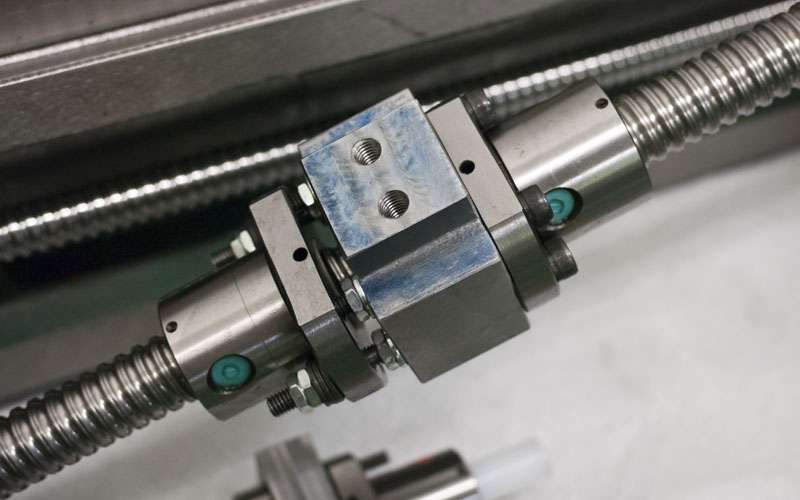After waiting days to get a quote, I called one of the distributors again and he was waiting for prices from Nook.
I then found a source,
reidsupply.com, for online purchase for Nook and Thomson ball screws & nuts with pricing.
Then finally, late this afternoon, I got a quote on the Nook ball screws & nuts.
Let's start with the Nook quote from Motion Industries
Nook 5/8" ball screws & nuts
SRT9987 5/8" x .200 x 48" x .004"/ft accuracy ball screw (18.38/ft) $ 73.52
SRT7540 5/8" x .200 x 72" x .004"/ft accuracy ball screw (18.40/ft) $110.41
XPR6320R72 5/8" x .200 x 72" x .001"/ft accuracy ball screw (26.58/ft) $159.49
SBN10325 SRT series 5/8" single ball nut $ 56.19
Nook 3/4" ball screws & nuts
SRT7296 3/4" x .200 x 96" x .004"/ft accuracy ball screw ($34.04/ft) $272.35
SRT7248 3/4" x .200 x 48" x .004"/ft accuracy ball screw ($34.05/ft) $136.18
XPR7520R96 3/4" x .200 x 96" x .001"/ft accuracy ball screw ($50.53/ft) $404.25
XPR7520R48 3/4" x .200 x 48" x .001"/ft accuracy ball screw ($50.53/ft) $202.13
SBN7201 SRT series 3/4" x .200 single ball nut $125.17
SBN7202 SRT series 3/4" x .200 double ball nut $248.36
SEL10057 SRT series 3/4" x .200 adj. preloaded dbl ball nut $625.02
PRN10109 XPR series 3/4" x .200 preloaded dbl ball nut $775.84
SSN0390 XPR series 3/4" x .200 preloaded flanged dbl ball nut with wipers $909.14
The prices for the Nook 3/4" SRT series from reid supply were just a bit higher, but they don't carry the XPR line. For 5/8", they offer Thomson products with a .004"/ft lead accuracy at a lower cost.
Reid Supply
AR-315 Nook SRT7296 3/4" x .200 x 96" x .004"/ft ball screw $277.07
AR-305 Nook SRT7248 3/4" x .200 x 48" x .004"/ft ball screw $138.54
AR-315 Nook SBN7201 3/4" x .200 single ball nut $127.34
TBS-20 Thomson 5707540 CTL 36 5/8" x .200 x 36" x .004"/ft ball screw $ 47.43
TBS-29 Thomson 5707540 CTL 72 5/8" x .200 x 72" x .004"/ft ball screw $ 91.16
TBS-412 Thomson 7820827 5/8" x .200 single ball nut $ 42.91
To convert my mill, I will need about 3' for the Z axis and 3' for the X and less than 2' for the Y. This will allow me to mess up once on each axis when machining the ends. Of course if I don't then I will have some left over, perhaps a saleable scrap.
My original plan was to use Roton 3/4" ball screws for all axes.
Roton option - 3/4" on X Y & Z with doubled single ball nuts
$438.34
Screw, 3/4 X .200 x 96" .003-.009" 24.56/ft 8 @ 24.56 = 196.48
Round Ball Nut, 3/4 X .200 single ball nut 6 @ 40.31 = 241.86
Option 1 - Nook 3/4" on X Y & Z with doubled single ball nuts $
1,023.37
Upgrade to XPR screw additional (16.49/ft) + $ 131.92 = $1,155.29
Nook SRT7296 3/4" x .200 x 96" ball screw 1 @ 272.35 = 272.35
Nook SBN7201 SRT series single ball nut 6 @ 125.17 = 751.02
Option 2 - Nook 3/4"-Z & Nook 5/8"-X Y w/ doubled single ball nuts $
721.69
Upgrade to XPR screw additional 65.96 + 49.08 = + $115.04 = $836.73
Nook SRT7248 3/4" x .200 x 48" ball screw 1 @ 136.18 = 136.18
Nook SBN7201 SRT series single ball nut 2 @ 125.17 = 250.34
Nook SRT7540 5/8" x .200 x 72" ball screw 1 @ 110.41 = 110.41
Nook SBN10325 SRT series 5/8" single ball nut 4 @ 56.19 = 224.76
Option 3 - Nook 3/4"-Z & Thomson 5/8"-X Y w/ dbl single ball nuts $
649.32
Upgrade to XPR screw on Z axisadditional (16.49/ft) + $ 65.96 = $
715.28
Nook SRT7248 3/4" x .200 x 48" ball screw 1 @ 136.18 = 136.18
Nook SBN7201 SRT series single ball nut 2 @ 125.17 = 250.34
Thomson 5707540 CTL 72 5/8" x .200 x 72" ball screw 1 @ 91.16 = 91.16
Thomson 7820827 5/8" x .200 single ball nut 4 @ 42.91 = 171.64
Option 4 - Nook 5/8" all (counterbalance head) w/ dbl single nuts $
521.07
Upgrade to XPR screw additional (8.18/ft) + $ 81.80 = $602.95
Nook SRT7540 5/8" x .200 x 72" ball screw 1 @ 110.41 = 110.41
Nook SRT9987 5/8" x .200 x 48" ball screw 1 @ 73.52 = 73.52
Nook SBN10325 SRT series 5/8" single nut 6 @ 56.19 = 337.14
Option 5 - Thomson 5/8" all (counterbalance head) dbl single nuts $
396.05
Thomson 5707540 CTL 72 5/8" x .200 x 72" ball screw 1 @ 91.16 = 91.16
Thomson 5707540 CTL 36 5/8" x .200 x 36" ball screw 1 @ 47.43 = 47.43
Thomson 7820827 5/8" x .200 single ball nut 6 @ 42.91 = 257.46
Conclusions:
The Nook ball nuts get really pricey fast!
Option 1 is just too expensive for my budget and more than the mill requires
Option 3 is more expensive than option 4 with the XPR upgrade with much lower accuracy
Option 5 is about the same cost as the Roton plan, but with better accuracy
Option 2 w/XPR is twice what I budgeted, but the best choice for accuracy & life but is about $230 more than option 4
I choose ...
Option 4 w/XPR ball screws at about 50% more than I planned. I will lose some accuracy with the SRT series Ball nuts but save a ton of money. Compare the 3/4" ball nut prices above.






 Reply with Quote
Reply with Quote




